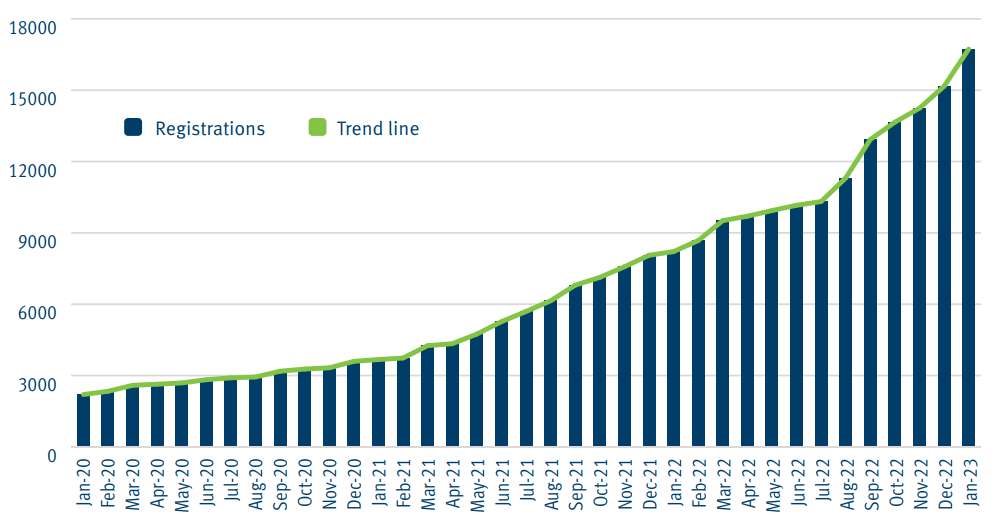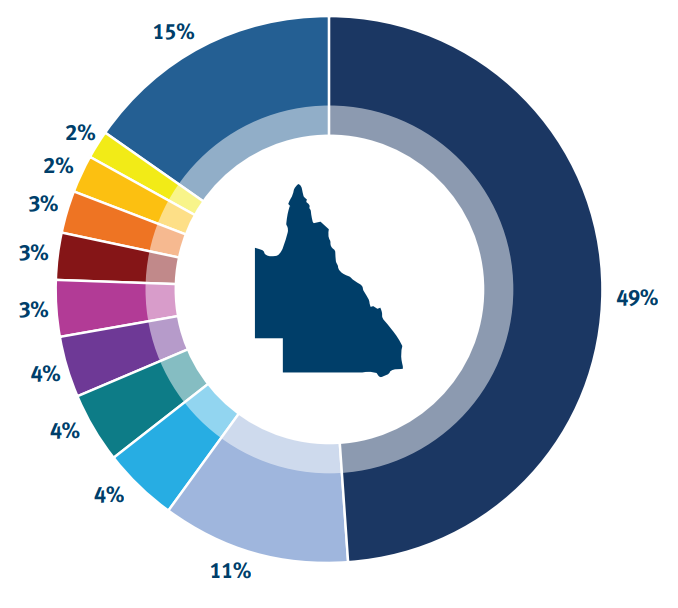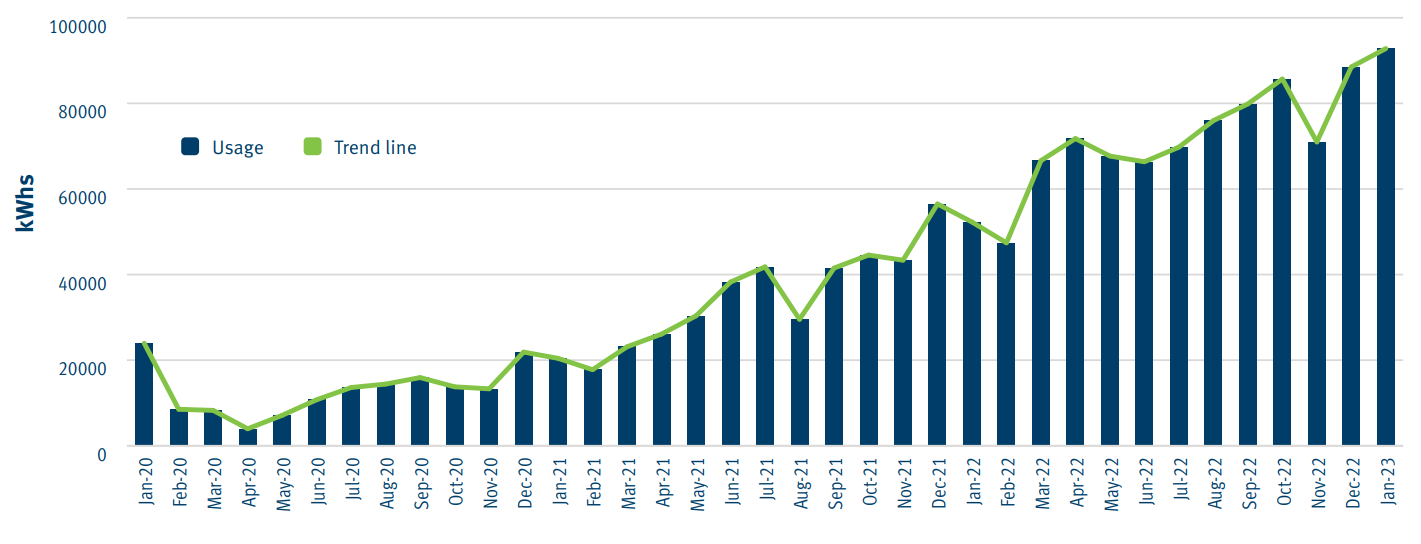Electric vehicle snapshot January 2023
Battery Electric Vehicles (BEVs)
Battery electric vehicles registered in Queensland
As at 31 January 2023.
Registered battery electric vehicles include passenger cars, light vans, motorcycles, buses and trucks. Registration data includes private ownership, commercial fleet, and commercial dealership registrations.
Registrations
Trend line
This graph shows the number of battery electric vehicles registered in Queensland from January 2020 to January 2023.
| Month | Number of battery electric vehicles registered |
|---|---|
| January 2020 | 2,201 |
| February 2020 | 2,337 |
| March 2020 | 2,588 |
| April 2020 | 2,636 |
| May 2020 | 2,691 |
| June 2020 | 2,824 |
| July 2020 | 2,904 |
| August 2020 | 2,939 |
| September 2020 | 3,182 |
| October 2020 | 3,273 |
| November 2020 | 3,326 |
| December 2020 | 3,597 |
| January 2021 | 3,673 |
| February 2021 | 3,737 |
| March 2021 | 4,258 |
| April 2021 | 4,339 |
| May 2021 | 4,743 |
| June 2021 | 5,266 |
| July 2021 | 5,695 |
| August 2021 | 6,143 |
| September 2021 | 6,801 |
| October 2021 | 7,129 |
| November 2021 | 7,574 |
| December 2021 | 8,057 |
| January 2022 | 8,213 |
| February 2022 | 8,676 |
| March 2022 | 9,516 |
| April 2022 | 9,701 |
| May 2022 | 9,938 |
| June 2022 | 10,161 |
| July 2022 | 10,318 |
| August 2022 | 11,312 |
| September 2022 | 12,928 |
| October 2022 | 13,656 |
| November 2022 | 14,244 |
| December 2022 | 15,166 |
| January 2023 | 16,731 |
Suburbs with most Battery Electric Vehicles (BEVs) registered (passenger cars)
| Suburb | Number of BEVs (passenger cars) |
|---|---|
| Brisbane City | 285 |
| Southport | 207 |
| Surfers Paradise | 170 |
| Hope Island | 156 |
| Rochedale | 144 |
| Robina | 138 |
| Fortitude Valley | 133 |
| All others | 14,077 |
| Total passenger BEVs | 15,310 |
| Total BEVs | 16,731 |
EV fleet penetration: 0.4%
Battery models registered in Queensland (passenger cars)
Tesla 3
Tesla Y
BYD Atto 3
MG ZS EV
Nissan Leaf
Hyundai Kona
Tesla S
Hyundai Ioniq
Tesla X
Volvo XC40
All others
This graph shows the percentage of battery electric vehicle models (passenger vehicles) registered in Queensland as of 31 January 2023.
| Model | % Registered* |
|---|---|
| Tesla 3 | 49 |
| Tesla Y | 11 |
| BYD Atto 3 | 4 |
| MG ZS EV | 4 |
| Nissan Leaf | 4 |
| Hyundai Kona | 3 |
| Tesla S | 3 |
| Hyundai Ioniq | 3 |
| Tesla X | 2 |
| Volvo XC40 | 2 |
| All others | 15 |
* Please note: these values are rounded to whole numbers and may not total to 100%.
Queensland Electric Super Highway
Yurika own and operate all fast charging stations along the Queensland Electric Super Highway.
Usage
Usage
Trend line
This graph shows the number of kilowatt-hours used along the Queensland Electric Super Highway from January 2020 to January 2023.
A $0.20/kWh charge was introduced on 28 January 2020.
| Month | kWhs |
|---|---|
| January 2020 | 23,941 |
| February 2020 | 8,524 |
| March 2020 | 8,263 |
| April 2020 | 3,970 |
| May 2020 | 7,113 |
| June 2020 | 10,754 |
| July 2020 | 13,609 |
| August 2020 | 14,407 |
| September 2020 | 15,935 |
| October 2020 | 13,774 |
| November 2020 | 13,302 |
| December 2020 | 21,888 |
| January 2021 | 20,422 |
| February 2021 | 17,774 |
| March 2021 | 23,134 |
| April 2021 | 26,093 |
| May 2021 | 30,365 |
| June 2021 | 38,250 |
| July 2021 | 41,805 |
| August 2021 | 29,544 |
| September 2021 | 41,512 |
| October 2021 | 44,557 |
| November 2021 | 43,359 |
| December 2021 | 56,504 |
| January 2022 | 52,277 |
| February 2022 | 47,411 |
| March 2022 | 66,618 |
| April 2022 | 71,775 |
| May 2022 | 67,685 |
| June 2022 | 66,357 |
| July 2022 | 69,774 |
| August 2022 | 75,980 |
| September 2022 | 79,877 |
| October 2022 | 85,688 |
| November 2022 | 70,983 |
| December 2022 | 88,518 |
| January 2023 | 92,817 |
Popular fast-charging stations
| Suburb | Sessions | kWh Usage | %* |
|---|---|---|---|
| Hamilton | 12,156 | 231,196 | 13 |
| North Lakes | 7,559 | 122,493 | 8 |
| Coolangatta | 7,187 | 112,747 | 8 |
| Helensvale | 6,325 | 97,067 | 7 |
| Springwood | 5,766 | 104,401 | 6 |
| Springfield | 5,353 | 94,573 | 6 |
| Cairns | 4,435 | 79,120 | 5 |
| All others | 41,845 | 805,228 | 46 |
| Total kWh usage | 90,626 | 1,646,825 |
* Please note: these values are rounded to whole numbers and may not total to 100%.
Tailpipe emissions saved
2,065–2,423 tonnes saved by using Green Energy—equivalent to removing 704 cars off Queensland roads.
Kilometres charged
9,427,161km charged, equivalent to driving around Australia 650 times. Based on an estimated distance of 14,500km to drive around Australia and 1kWh equating to 5–6km travelled.


